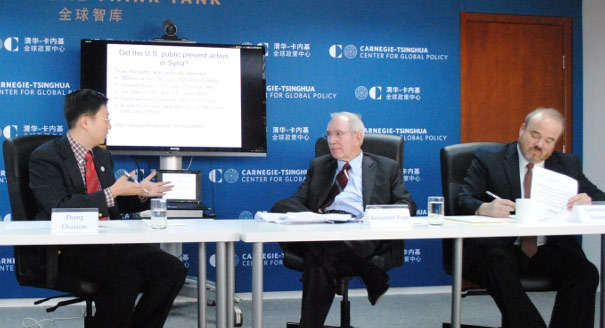Registration
You will receive an email confirming your registration.
When there was mounting evidence that Syria had used chemical weapons in its civil war, U.S. public opinion was strongly opposed to military action. When U.S. President Barack Obama decided not to take military action in Syria, his decision was perceived by many as heavily influenced by public opinion. But the role of public opinion on policymaking in the United States is complicated and deserves a more thorough examination.
Carnegie-Tsinghua’s Zhang Chuanjie hosted a roundtable discussion featuring Benjamin Page of Northwestern University and Lawrence Jacobs of the University of Minnesota. They discussed the impact of public opinion in U.S. policymaking.
Does Public Opinion Influence Policymaking?
Although government policy usually aligns with public opinion, there have been cases where U.S. presidents have pursued policies in opposition of public opinion.
- Syria: Page noted that the U.S. public largely opposed any type of military action in Syria, with half of the public opposing any military action even if Syria refused to turn over its chemical weapons. However, he explained that it was the military’s strong opposition to taking action that led to Obama’s inaction, not public opinion.
- Special Interests: Page presented his research on how the opinions of affluent and issue-specific interest groups in the United States have a significant effect on policymaking. He concluded that business leaders are the most influential group in the United States, followed by policy experts, and then labor leaders. The preferences of average citizens have no significant impact on policymaking, he argued.
- Economic Foreign Policy: Page discovered that the U.S. government often pursues policies that its citizens oppose, such as the North American Free Trade Agreement. He explained that the public and the foreign policy apparatus have drastically opposing views on economic policy—the average citizen placed greater importance on jobs and is more opposed to free trade than U.S. foreign policymakers, who view free trade largely in a positive light.
Purpose of Public Opinion Polling
Jacobs explained that the United States uses polling not as a means to shape policy to match the opinions of its citizens but as a means to influence the public’s stance towards certain issues.
- Priming: Jacobs stated that the White House has often used priming, a technique in which the policymaking apparatus attempts to evoke a positive response by addressing a specific dimension of a particular issue, as a way of influencing public opinion. For example, while the U.S. public may be opposed to military intervention, the majority of U.S. citizens care deeply about national security and safety. The White House can thus emphasize national security when proposing intervention in order to steer the direction of public opinion, he explained. Jacobs cited the 2003 invasion of Iraq as an example.
- Public Opinion Difficult to Sway: Although political elites are confident in their ability to change public opinion, evidence shows their efforts have largely been ineffective, Jacobs said. He pointed out that whenever there is significant conflict between the political elite and publically available information, the government’s ability to change public opinion is limited. Han Donglin, a professor at Renmin University, added that the U.S. public’s stance on domestic issues is much more difficult to change than its stance on foreign policy, due to the amount of information available on domestic matters.
Structural Recommendations
Xie Tao, a professor at Beijing Foreign Studies University, raised the question of how the U.S. political system could be adjusted to better represent the U.S. electorate. Page and Jacobs offered insights on the current structure of American electoral politics and ways the system could be changed to better reflect the public’s wishes.
- Nomination Process: Jacobs described how the current process of nominating political candidates gives too much voice to those with extreme views who do not represent the U.S. public. He gave the example of how primary elections are open only to registered members of any given party and thus grant too much power to special interest groups.
- Financial Considerations: Page stated that money plays a much larger role in the U.S. electoral process than it does in that of other countries. He suggested that the United States reform the campaign process to limit business interests’ contributions, which currently influence policy far more than the average citizen.
- District Re-zoning: Jacobs described how single-member districts are intentionally drawn to ensure that their party affiliation does not change. He recommended that districts must be redrawn in order to ensure that a variety of voices from all parties are present in every region and not simply relegated to small areas.
Discussants: Xie Tao, Patrick Mendis, Han Donglin, Horace Campbell
